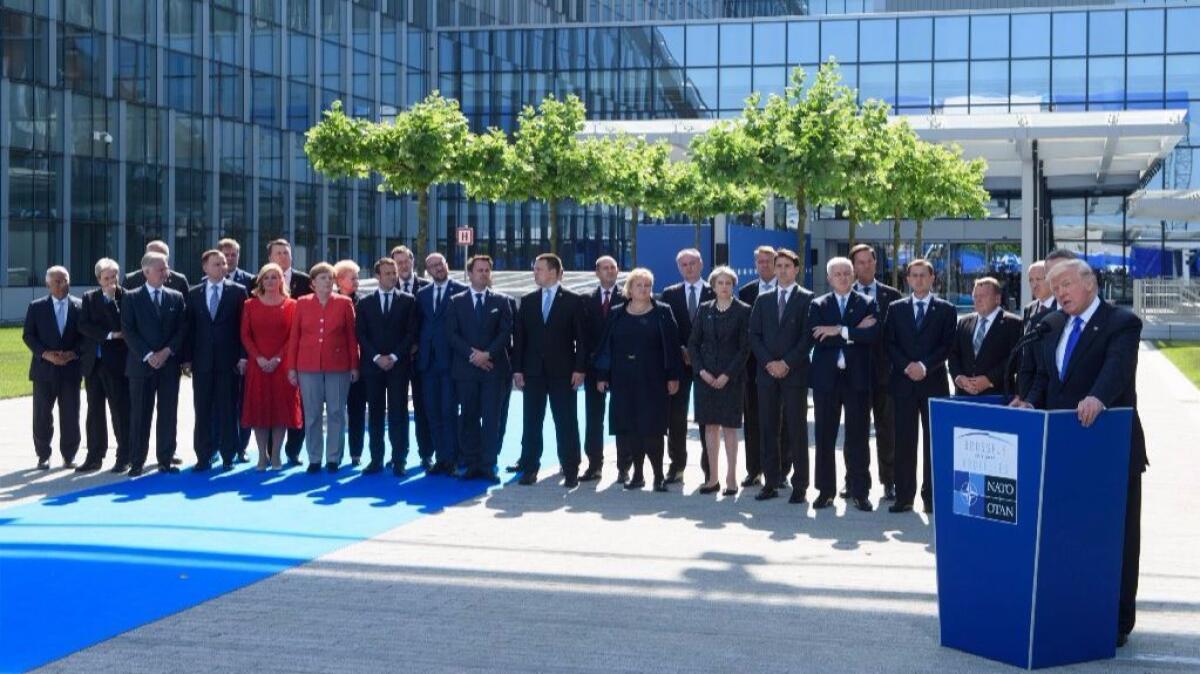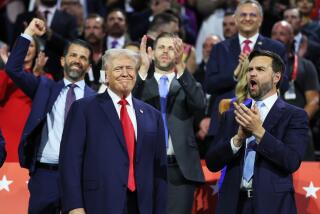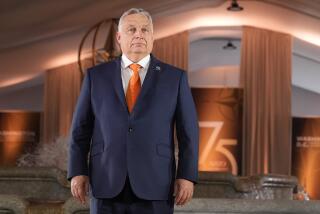Trump scolds NATO allies for not spending more on defense

Reporting from Brussels — President Trump directly rebuked NATO allies for not paying their fair share of military costs, as they stood stone-faced nearby, and stopped short of reaffirming the alliance’s mutual defense pledge as the foreign leaders met Thursday for a celebration of unity.
The unusually pointed remarks at the dedication of the North Atlantic Treaty Organization’s gleaming new headquarters showed the limits of Trump’s recent warming to the nearly 70-year-old organization, which, as a candidate, he lambasted as obsolete.
For the record:
4:10 p.m. May 25, 2017An earlier version of this article said special correspondent Catherine Stupp’s last name was Strupp.
Compounding the awkwardness, Trump spoke beside a newly installed relic of the World Trade Center towers downed on Sept. 11, 2001. The twisted steel commemorated the one and only time that NATO invoked its mutual defense pledge, Article 5 of its founding charter — in defense of the United States.
Candidate Trump’s skepticism about America’s key international alliances seemed to have lessened by the time he arrived Wednesday in Brussels, the seat of the European Union and NATO’s headquarters. Last month, Trump declared that NATO was no longer obsolete, thanks in large part to his prodding.
But by his remarks Thursday, the “America first” president reprised his core critique about what he called allies’ “chronic underpayments,” and did so face to face with his counterparts in NATO. Several looked disgusted, and some exchanged glances and whispers.
Trump noted that the United States has spent more on defense in eight years than the other 27 member countries combined, and that 23 of the countries still don’t meet a NATO target of spending 2% of their respective nations’ economic output on defense.
“This is not fair to the people and taxpayers of the United States,” Trump said. “Many of these nations owe massive amounts of money from past years.”
“We have to make up for the many years lost,” he added.
For European allies, the skepticism remains mutual. NATO members had hoped that Trump would explicitly endorse Article 5, but he did not. He did, however, approvingly note that after Sept. 11, “our NATO allies responded swiftly and decisively, invoking for the first time in its history the Article 5 collective defense commitments.”
It is a measure of allies’ worries about Trump that they needed to hear a more fulsome endorsement of the defense pact.
Speaking to reporters after the leaders’ working dinner, NATO Secretary General Jens Stoltenberg played down the omission. Just by speaking at the commemoration, Trump “sent a strong signal,” Stoltenberg said.
“We have heard President Trump before being very blunt on the message of fair burden sharing,” he said. “Several allies expressed that we have to invest in defense not just to please the United States. We have to invest in defense also because it is in our interest to do so.”
Separately, NATO members agreed to formally join the U.S.-led coalition battling Islamic State in Syria and Iraq, as the Trump administration wanted. The move is mostly symbolic, however, since NATO members already are in the coalition as individual states.
Trump’s lecture on NATO nations’ defense spending came at the moment intended to call attention to the time the alliance came to the aid of the United States in Afghanistan, where more than 1,000 non-American NATO personnel died. The steel from the World Trade Center’s North Tower is called the “Article V artifact,” symbolizing the NATO provision that says an attack on one member would be considered an attack on all.
Also unveiled, by German Chancellor Angela Merkel, was a section of the Berlin Wall intended to evoke the founding purpose of NATO as a check on the Soviet Union during the Cold War.
In her remarks, Merkel seemed to send a statement as well, to Trump.
“It is not isolation or the building of walls that will make us successful, but the sharing of values,” Merkel said, bringing to mind Trump’s promised wall on the U.S.-Mexico border as much as the long-fallen Berlin Wall.
A new point of tension between Merkel and Trump was suggested by the German magazine Der Spiegel, which reported that Trump in a discussion about trade said, “The Germans are bad, very bad. See the millions of cars they are selling to the U.S.? Terrible. We will stop this.”
Just hours before the NATO ceremony, in Berlin, Merkel sat side by side with former President Obama, with whom she enjoyed a close partnership. Obama, like presidents before him, also pushed NATO members to ramp up defense spending.
At NATO’s 2014 summit in Wales the alliance agreed, at the Obama administration’s urging, to gradually increase military spending. But Trump suggested in his remarks that the obligation has new resonance given threats of international terrorist networks “as well as threats from Russia” in Eastern Europe.
Some analysts say Trump is overemphasizing a defense-spending benchmark that is far from perfect.
“Certainly, there are some countries that spend more than 2% of their GDP who do not get much out of that, at least in terms of capabilities that are at the disposal of the entire NATO alliance and contributing to transatlantic security,” said Jeffrey Rathke, deputy director of the Europe program for the Center for Strategic and International Studies.
“The challenge has always been to find better measures of quality that are more meaningful, and that can be distilled into something politically powerful.”
Most nations spend 1.2% to 1.6% of their gross domestic product on defense, Rathke said, but in recent years Canada and European nations spent an additional $10 billion to address the gap. By year’s end, eight of the 28 current NATO nations will be at 2%, while almost all others will be inching toward it.
Nations still short of the target, notably Germany, cite other contributions they make to the alliance that aren’t fully captured by the 2% threshold. Prime Minister Justin Trudeau of Canada, which ranks near the bottom, told reporters that his nation has nonetheless always been “one of the go-to countries” for NATO missions.
Trump would see another example when he landed Thursday night at the Sigonella Air Naval Station in Sicily ahead of the upcoming meeting of the Group of Seven developed nations. The U.S. shares the complex with NATO and Italy, which use it as a base of operation for missions across the Mediterranean involving Libya, among other regional hot spots.
The G7 meetings in the Sicilian vacation town of Taormina will cap Trump’s first international trip as president, one that has been distinguished by two seemingly opposite moods. The underlying tensions with European allies were in contrast to the mutual embrace that Trump enjoyed in Israel and with Sunni Arab leaders during the trip’s first half
Also Thursday, Trump met for the first time with new French President Emmanuel Macron, who defeated the far-right candidate, Marine LePen. Trump was considered partial to Le Pen, though he did not endorse her. Trump and Macron discussed fighting terrorism, and Macron — echoing other Europeans and the Vatican — expressed hope that Trump will reverse his pledge to scrap the Paris climate deal.
Macron’s election on an unabashedly pro-European Union platform seem to signal something of a counter-reaction to the kind of nationalism behind Trump’s election and Great Britain’s vote last year to leave the European Union.
Trump also met with EU leaders in Brussels. Donald Tusk, president of the European Council, said differences remain between the Trump administration and the EU on Russia, energy and trade.
“I am not 100% sure that we can say today… that we have a common opinion about Russia,” Tusk, a former Polish prime minister, said after a meeting with Trump at EU headquarters.
Tusk added that while some issues “remain open, like climate and trade,” the leaders agreed “first and foremost” on the need to combat terrorism — an imperative underscored by Monday’s suicide bombing at a pop concert in England.
For more White House coverage, follow @mikememoli on Twitter.
Special correspondent Catherine Stupp in Brussels contributed to this report.
ALSO
Manchester attack makes terrorism the focus of Trump’s NATO meeting
Trump urges Israelis and Palestinians to work together for peace
For 70-year-old president who likes his own bed, this trip is exhausting
Get live updates on our Essential Washington news feed
More to Read
Get the L.A. Times Politics newsletter
Deeply reported insights into legislation, politics and policy from Sacramento, Washington and beyond. In your inbox three times per week.
You may occasionally receive promotional content from the Los Angeles Times.











